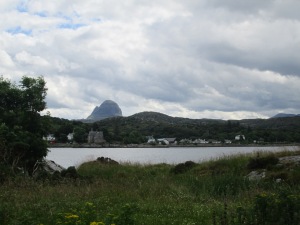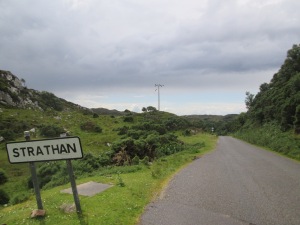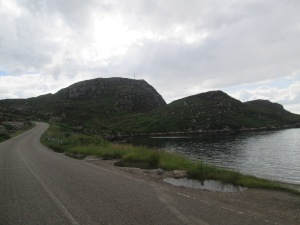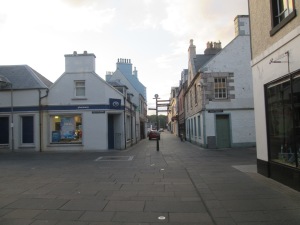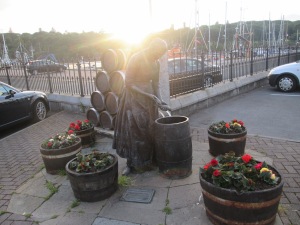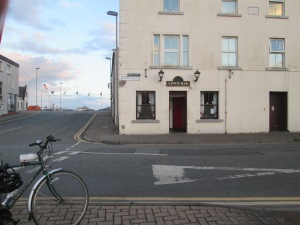‘The most terrible creature on this planet? It’s the human. We destroy everything… closely followed by the midge, and the tick!’ – Greg, Lochinver.
I awake with a fierce hangover on a shrubby hillock in the heart of Culag woods, a small but dense forest overlooking the fishing village of Lochinver. The beer, whisky and good times made sleeping easy, but the surface around me is uneven and boggy. Some strange little insect has lodged itself in my arm and with some difficulty I manage to squeeze it out. I’ll quickly become accustomed to these nasty critters. My socks and much of the tent are soaked through, and a pair of damp and whiffy socks are unhappily thrown away as tribute to the rain gods.
It’s a Sunday morning and the overnight rain seems to have cleared. Being dependent on tourism and fishermen, Lochinver actually has a shop and tourist office open, with a little museum at the back. There’s nothing about the wretched people of Assynt that Pennant saw, but the collection completes the pieces of a familiar puzzle. After Culloden, the local MacLeod chiefs had their obligations to their clans removed. Like other highlanders, they took well to making money from their lands, and gradually adopted a London-based lifestyle of the rich, spending the income of their estates in coffee houses and card tables. Debts lost them the land to the enterprising Duke of Sutherland. Over the early 19th century local farmers were burnt out and cleared to make room for sheep farming. Economic profit continued to trump traditions and human lives.
Lochinver was built in 1812 as a fishing port for these evicted farmers, and over the following nine years the surrounding area – that Jurassic wilderness I passed through yesterday – saw burnings and evictions. There were riots in nearby Inchnadamph against the collusion of the local church with the lairds, but most people were forced by starvation to move to Canada, Australia and elsewhere. By the 1870s the price of wool collapsed, and greedy lairds faced financial ruin, until Queen Victoria turned the Highlands and hunting into an English aristocratic retreat. Whilst the rich came to holiday, those locals who managed to eke out a living through croft-farming or fishing struggled to survive. It was a bleak place. Some organised deer raids against the rich, driving away toffs and their game to preserve ‘the land of Assynt to the people of Assynt.’
Something of this tough, rebellious history remains. The crofters of Assynt bought back their land as a community trust in 1991, restoring it to the people for the first time since the bitter aftermath of Culloden. Today they’re building affordable housing for young people and working together communally to develop a better future for the place. Though one local told Greg that ‘there’s too much fuckin’ committees, one overruling the other’, that’s an unfortunate side-effect of working together in common and being accountable. It’s a tricky balance.
Communities have also bought back their own land on the Isle of Eigg, and on the mainland peninsula of Knoydart, and increasingly across the Hebrides. It’s a story I’ll trace as I travel on. There’s something immensely promising about local people retaking their land, and lives, from aristocratic parasites and property speculators.
Gaelic once the language but lost during 20th century. Woman in tourist office, aware of Gaelic mediums but few know how to speak it here. Possibly in towns like Ullapool or Inverness could be learnt at school.
I chat with a local woman in the centre about the Gaelic language. She’s aware of Gaelic mediums, and can understand a little of it herself, but tells me ‘few know how to speak it here.’ Again, she identifies a lost generation of Highland and Islands Scots between their early 30s and 50s who were brought up without their tongue.
The previous boozy night, Greg gave me his address and number and invited me to stop by before leaving. On the way up I bump into Kyle, the singer from the previous night. He’s doing a tour of the Highlands, stopping in bars where he can play. There’s Tongue and Eriboll ahead of him – ‘the best is yet to come!’ I tell him. He’s already in love with Scotland, a place he finds like Iceland but with less trees. We wish each other well and head in separate paths.
Greg’s place is near to a promontory overlooking Loch Inver, with the great mount Sullivan looming in the distance. As he opens the door, Florie barks away and jumps up to greet me. The flat is an explosion of books, art and a rich life’s miscellany, packed up in piles or shelves or screwed onto the walls. As he potters about I spy books on mountaineering, folk poetry and Scotland’s many histories. Three pieces of wood hang on the wall in the shape of a harp, next to a painting of a ship.
Greg’s a story-teller. At first I’m unsure what that might mean in practice, but it becomes clear when the simple or mundane question leads to a fascinating flow of a reply that threads humour, anecdote and insight that leads from the weather, the street, or the style of one’s shoes to the history of whaling or the peccadilloes of American tourists.
Whaling is an object of fascination for him. ‘Very dangerous’ work it was, drawing men from Orkney, Shetland and the eastern coast of Scotland and northern England into the freezing stretches of the Artic. Boats could be out for great periods of time, from February to December, in a maddened determination to ensnare the gods of the deepest oceans. Let this be an excuse to bring in Herman Melville:
‘All that most maddens and torments; all that stirs up the lees of things; all truth with malice in it; all that cracks the sinews and cakes the brain; all the subtle demonisms of life and thought; all evil, to crazy Ahab, were visibly personified, and made practically assailable in Moby-Dick.’
Whalers would get very rich, taking a good pay and a cut of the final profits. Many would be found in the pub when not at sea. Greg compares it to oil in Aberdeenshire, his home.
‘You know, I regret not taking up being a diver. This was back in the 70s, I was working in social services. I used to get £400 a month, not bad money, but I could get £500 a night just being a relief diver.’
Scotland’s oil boom began in the 1970s. Work was well-paid but dangerous. Divers were needed to go down for around fifty minutes to weld oil pipelines. Under such cold depths there were the dangers of the bends – ‘come up too quick and your blood would just burst, you’d have a heart attack’. Divers would go up and down in stages, then spend a week in a decompression chamber.
‘The real danger wasn’t in the sea. These idiots would fall asleep at the dials. One guy was a total pisshead. A feller died of a heart attack in those chambers, they just ignored him. There wasn’t much health and safety back in them days, you know.’
I’d sonner have my loved ones near me than the money and isolation on a trawler or rig. But in these isolated spots it’s possible to see how such a life could be feasible. Like Dylan told me the previous day, there just isn’t that much around these parts, few people and few things to do. There isn’t the range or intensity of experiences and encounters one finds in a city. That’s why people often tell me, when I tell them about my home, London, that ‘I like the place, but there’s no way I could live there’. Life in Talmine, Inchnadamph or Kylesku already approximates that isolation.
These activities are also destructive, wrecking habitats and near-annihilating species. Few in these lines of work seem to reflect on this, which is understandable. Greg sees it as evidence of humankind’s innate ignorance and cruelty. The thought sticks with me for the remainder of the day.
Yes, we have remodelled much of the land to feed ourselves and provide energy for our iPhones. But considering the landscape here, there is as much evidence that humans also protect and preserve. This landscape isn’t one of nuclear power plants or turbines. Trees are replaced, parks and lakes are maintained. This hatred of ourselves seems based on a mistaken idea that humans are not of nature. But these small settlements like Lochinver, or take say the suburban sprawls of London, the West Midlands, or Glasgow. They remain meagre compared to swathes of wilderness around them. The average ant probably suspects that its city-colony is the world. Other creatures reshape the lands as they need, wiping out other species accidentally as they go. The prospect of climate change is human-caused, to a degree, though much of the damage has been caused by the methane farted out by cattle grazed for Big Macs and Nike airs.
I can’t help feeling ambivalent about it. History presents countless other instances of climate changes over the previous centuries. Places like Doggerland, connecting the British mainland to Europe, have since been lost to the North Sea. Our histories suggest we could collectively manage the environmental catastrophe that’s anticipated by the end of this century through the necessity of survival. The 20th century found ways to feed (mostly) a global population that grew from just over 1.5 billion to 6 billion. I wonder if, in overemphasing the badness of human nature as we often do – a ‘a war of all against all’, as Thomas Hobbes has it – the belief that cooperation and reason can aid humans to create a better future is lost. This belief is the basis of the change needed today.
Such conversations are the serendipitous fruit of chance encounters with strangers. Greg Allen is a storyteller for hire, and has worked in radio for some years. You can message him and find out more, and I suggest you do: telliesperie@gmail.com. I have a shower at his place and a cup of tea, then get ready to leave. As I’m putting on my shoes, Greg shares his own dream, to travel from North to South Uist on the Outer Hebrides by horse, telling stories in pubs and passing places. It may seem like a peculiar dream but with a man like Greg, it’s probable, and would no doubt be wonderful. The isle of Lewis is my next destination, and Greg gives me a warning:
‘Nothing used to be open on Sundays in past. You couldn’t even drive your car or cook a meal, had to be done on Saturday! If they spotted your car away from the front, they’d suspect you were working. They spend all day in church!’
When Greg visited some years ago, he and his late partner stayed with her mother, a devout worshipper at the Free Church. Not a religious man but curious about it, Greg put on his best shirt and corduroy trousers. ‘Oh no’, the woman said, ‘you’re not going to church like that. Folk would talk! You need a suit!’
I’m even more intrigued by these strict and proud traditions, so contrary to the Nazarene man who taught that God is love, forgave even the tax-collectors, and washed the feet of his disciples.
I leave Greg and his stories, and take a gamble on a small road heading south from Lochinver to Inverkirkaig. The road should eventually reach Ullapool through some esoteric route, but no local has been down it before. The adventure is scintillating. The track is just wide enough to accommodate a small car, and stoops up and down hills, bends about dizzily around clefts of crags, thriving forests and humid, prehistoric glens.
There is no one here.
No human life, just the deer and the fern, the heather and the gorse, and great hunting birds looming above me. Dark gorges and brown moors in the glens twist into mountain ranges as distant and magnificent as the adventures of Odysseus. After Inverkirkaig, little more than a couple of houses and perhaps the most remote bookshop in the universe, I cross into the county of Ross and Cromarty and, through that, pass into a timezone three thousand years prior to 2014.
It would be no flight of fancy to suppose some small band of Macleods, or Picts, or Neolithic hunters emerging from these bursts of shrub and tree around me. They might raise a bow at this dark object whooshing down this hill, a confusion of metal and man, or raise a hand of greeting. By this empty bay of a nameless loch, some local women might raise their eyes from bait preparation or shellfish foraging and glimpse me pass, trade teeny crabs for bananas or dried fruit. Blackened and dessicated trees flourish from hillsides like antlers of fallen stags. Time zones overlap.
Sheep occasionally block the path, a hardier and tougher breed than those I passed in the east. Curious, friendly, they look at me with a degree of intelligent interest. This is a superb route, the best so far, in such a verdant and mysterious landscape. A strange magic buzzes and breezes by me, emanating from a terrain that few humans have sought to intrude themselves on, either lost, or desiring to reach the darker parts of one’s mind, a pleasure in pushing through the limits of the unknown.
There are very few cars, but those I pass struggle to navigate the road, and rarely think to stop at passing places. This is a dangerous road I sense, and my suspicions sadly come true.
Up one steep hill, a silver car thunders down past a passing place and right towards me. Instead of giving me a slither of path to pass it, as one would expect, it accelerates and thunders towards me. I have to crash the bike into the verge to avoid getting hit.
My right hand side smashes against the rock of the road, my shoulder taking the brunt of the damage. I can’t believe I’ve just been run off the road!
I get myself up and check my aches. Very luckily I suppose, my arm isn’t broken and my clothes aren’t torn. I’ve managed to avoid falling right off the verge and into some deep ravine nearby. Rage and pain permeate my brain, a sour cocktail.
‘You could’ve given me a little room there’, I say, as the guy, a young Lowlands Scot with a flashy silver car, gets out.
‘Are you ok?’
I pick my bike up. ‘I’ll live.’ The pain in my shoulder is bad and my hand is bloody. I feel like communicating this pain to him through some violent physical exertion but there’s no point. He drives away at similar speed, and my mind summons up the impressive choice of expletives available in the English tongue. Which one to choose?
The landscape becomes bleaker than ever, and the red deer and sheep are few and far between. It’s the first accident I’ve had where it’s not been my fault (the previous have been quite funny: flying off the bike once after misjudging a pothole on a dark rainy evening in London, and collapsing like a fool on a tramline in Nottingham), and I realise I’ve had a lucky escape. I think of those people who brag about hitting cyclists on twitter, of those that complain about them on roads. Wearing high-vis gear and a helmet should have made me visible. But most drivers aren’t a problem, and drivers in Scotland have been on the whole cordial and careful.
It was a momentary misjudgement on his part, I suppose, the rage dissipating. Perhaps he’s a tourist unfamiliar with the route. Perhaps he didn’t see me, distracted with the same magic landscape? I hope that the encounter will remind him to be more careful. Perhaps it’ll prevent a more lethal misjudgement in the future?
To err is human. Hatred and anger won’t accelerate these miles ahead up this bumpy road. They become internalised and then unfairly inflicted on others. Why shout at the next driver? I try to focus on other drivers being fairer, those who toot as I let them pass. It’s not shaken me, but a reminder to be extra careful.
The weather’s just as turbulent. Torrential rain gives way to burning afternoon sun. Taking off these natty new waterproof trousers, a two minute task, attracts every midge in the surrounding square mile. Again, why swipe at them or lose my temper? I travel on in some pain, ascending a wind-swept bleak plateau. The desolation starts to play in a more plaintive key.
There are no settlements on this route, and very few sheep. One steep hill gives way to a beautiful loch with distant bens in the horizon. It is remarkable, but so alone and isolated. Had I broken my arm, I would’ve been in quite a bad situation. I have no phone coverage and very few cars pass, and which would even stop to help me? For a brief escape into another timezone, yes, this landscape is quite something. But it will tear at one’s insides too. Sometimes the payment is too harsh.
Eventually by Loch Bad a’ Ghaill the road splits, either west towards remote Reiff, or east back towards Ullapool. I take the latter, still on a single track road that beads and bends along a loch-side path full of visual pleasures. By the time it reaches the main road back to Ullapool, the scenery has become less interesting, and the road to Ullapool is a little dull though safer. Coach and motorhome overtake me at speed, whizzing retired tourists to their next tickbox tourist trap. Moments like Ardmair, a cheery seaside splatter of caravans and ice-cream stores gladly interrupt the flow of trees with a sweeping bay and gorgeous mountains. It seems like a place to unwind, but I carry on, tired and melancholy, seeking some new island.
Ullapool arrives after a time, a town that begins with pretty Swiss-looking chalets and tastefully built hotels for Highlands tourists. In the distance it looks tiny, and my home of Camberwell would dwarf it in scale. But after miles and miles of sheer abyss, it is indeed a town! There is a long street that flanks the coastline, with a harbour in the distance, and a main street with a bookshop, reputable chippies and a few hotels.
I book a ferry ticket to the Isle of Lewis at the Calmac office, and soak up the apprehensive port atmosphere: kids wailing, shit radio talk shows and bored drivers rapping the dashboards of their cars, before venturing to a tesco to stock up on grub.
En route I meet Rowena, a retired English woman who lives in Ullapool. She tells me about the sports here, rowing and the like. Anticipating my line of questions, she tells me that ‘there’s not many jobs’, and most tend to be in tourism, and the odd one in fishing, scallops and shellfish. The local school has a hall where travelling companies put on plays, but I get the impression of a very small town overinflated in scale by its guests. And with such a beautiful bay, why not? The schizoid climes turn good and the glaring sun has us visitors removing our waterproof hats and coats and gazing wistfully at the ocean.
Two local lads behind the cash-tills in Tesco point me to the town’s best chippie, by the Seaforth, and I head there for fried potatoes and Irn Bru. Along with two days’ nourishment of hobnobs, bananas, tortilla wraps, cheese and canned kidney beans, I head to the chippie for chips and a can of irn bru, then hurry back in time for the ferry.
The ride to Stornoway is smooth. Djokovic beats Federer in the Wimbledon final and my folks call me up to find out if I’m still alive. Later on, Lewis locals tell me more about this strange northern crop of the Outer Hebrides. One girl laughs incredulously as she tells me about the virulent protests against running a ferry service on a Sunday, a crime against the Lord’s day of rest. Reason almost prevailed, though some superstitious locals wore red shoes on the first passage, fearing that the Holy Ghost would have its revenge against such a transgression.
Stornoway is a much larger town than anything I’ve seen for weeks, and makes up most of the settled part of Lewis. It’s an ugly looking place. Aside from the pretty coloured sailing boats and the harbour and the looming fortifications of Lews castle, a long line of grubby and mean-looking grey houses and industrial premises strings the shoreline, with bland brown pebble-dash behind them. Nothing is open it seems. Pubs all around are boarded up. I find two locals talking together and ask where I might find an open hostelry. George points me to the Lewis Hotel, and says he’ll meet me in there.
Over a pint of McEwan in this seedy-looking but lively boozer, we get talking about Stornoway and Scotland. George tells me about the protests that took place when the town’s Indian restaurant first opened on a Sunday. His accent is harsh, kind of fast and has a kind of Welsh quality to it. Many signs are in Gaelic, but after questioning nearby locals it seems that ‘about half and half’ speak the language, with others having a vague understanding of it. English is the tongue used most often.
George works as an electrician on an oil rig and wears a ‘No’ badge, the first open sign of support for remaining in the union I’ve seen. He manages to skirt away from discussing either with an admirable ability to drift onto random topics, though I find out that ‘religion’s a problem here’, and meet a man deeply confused by the people of Shetland. Locals knock back shots and the TV plays Motown’s best songs. The barman gets me a map of the island and I trace Callanish on it, around 16 miles from Stornoway. It’s about half ten at night, but George assures me I’ll reach there, before slurring, forgetting what I’ve just said, and asking me about myself again.
I risk it. Bruised and sore, I ride out of Stornoway and into the most flat, featureless and bare of landscapes. Dark has already fallen – the gloaming’s far shorter here than in the tip-top Highlands – and I ride into a dark and lonely light, accompanied by a whistling wind and the strange music of my own thoughts. There are no signs of human life or habitation for most of it, and the feeling is like riding through some Saharan desert lightly coated in heather.
It’s around midnight by the time I get to Callanish, following a long westward road that reaches the edge of Lewis’s coast. I camp as near I can to what I think are the standing stones here, curious of their story and power, but it’s so dark I can barely make out a thing. Besides a small bay on another damp and uneven hill, camp is set and I collapse asleep.







